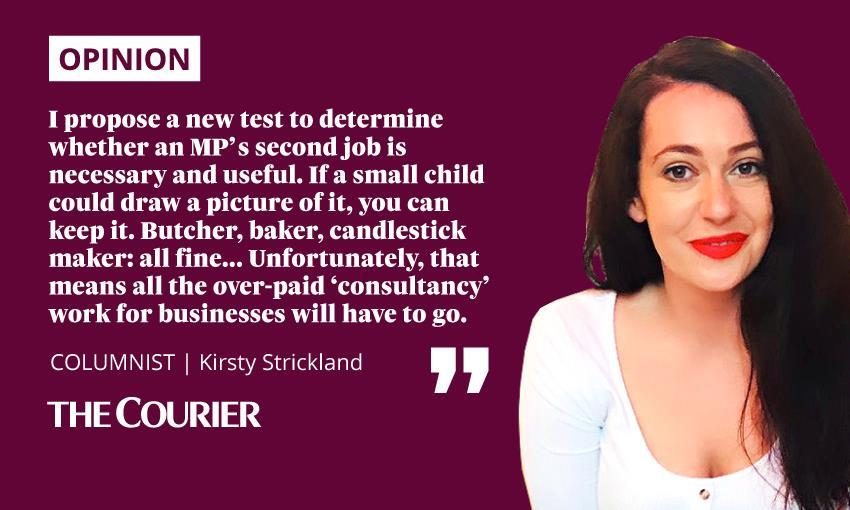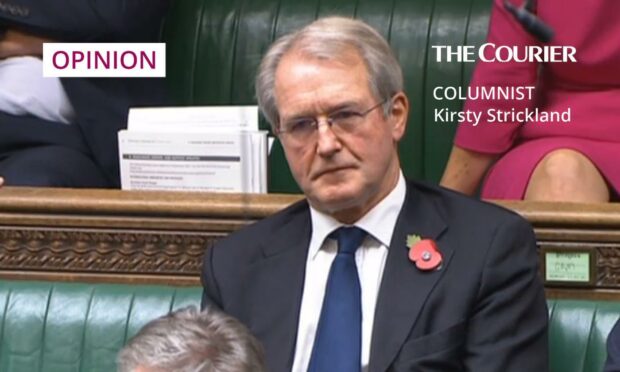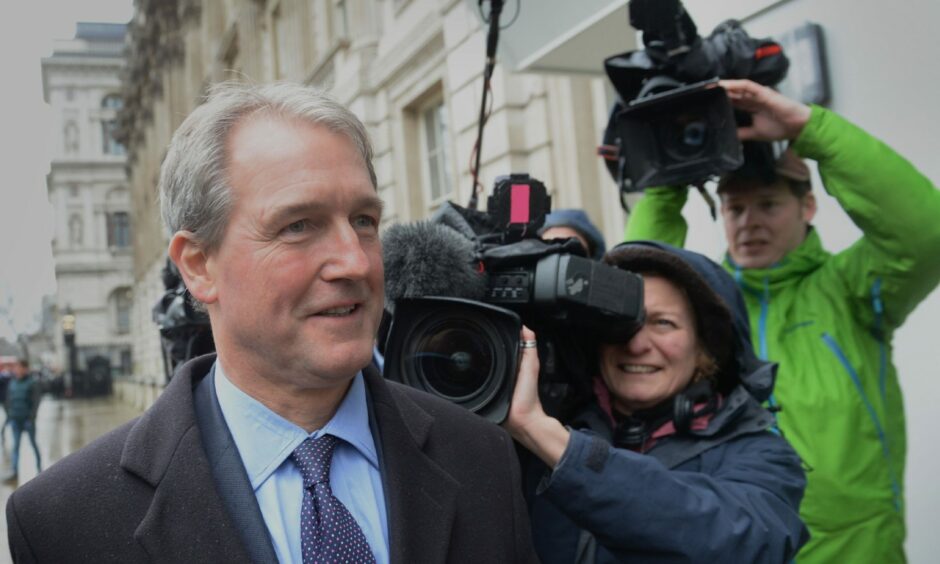And so the Owen Paterson standards scandal rumbles on into its second week.
A sustained period of negative headlines is not good news for any government.
It is especially bad news when words like SLEAZE and CORRUPTION are being linked to your party and shouted from the front pages.
But Boris Johnson only has himself to blame.
Maybe all that sunshine and top-drawer vino addled his brain and he simply didn’t realise that ordinary folk might not take too kindly to his government trying to change the rules to save the skin of one his rule-breaking MPs.

If he didn’t know before then he certainly does now.
The shady antics of the Tory government have sparked a fresh debate about the wider conduct of parliamentarians.
The Standards Committee found Owen Paterson had broken the rules in an “egregious’’ case of paid lobbying.
But what about all the other MPs who manage to dance on the right side of the rules, but still accept cash from big companies?
It is that gloomy grey area which is now under renewed scrutiny.
Bill could restrict second jobs
It boils down to this: should MPs (who are already paid handsomely) be allowed to take on a second job?
Labour MP Richard Burgon has described the current UK government as “the most corrupt in modern history’’.
He is proposing a Bill which would ban second jobs for MPs, except in some limited circumstances.
On the face of it, this seems sensible.An outright ban wouldn’t work.
There are some jobs, like nursing, where MPs should be entitled to maintain their professional registrations.
And given the pressure that the NHS is under, it wouldn’t be advantageous to ban MPs from working as doctors or in other healthcare roles.
This is the most corrupt Government in modern history.
Tory MPs can try to shout me down all they want – it won't change that. pic.twitter.com/NeK5D9nuA9
— Richard Burgon MP (@RichardBurgon) November 3, 2021
But it is clear that the rules as they stand are not tight enough.
Despite Boris Johnson’s shenanigans in trying to save Owen Paterson from the consequences of his actions, paid lobbying is already banned for MPs.
But when you look at some of the second jobs that MPs have taken and the staggering amounts they are being paid for them, you do have to wonder whose interests they are really acting in.
Owen Paterson and his colleagues have made millions from second jobs
An investigation by Open Democracy showed MPs have netted at least £6 millions from second jobs since the start of the pandemic.
That’s a huge amount of money.
They didn’t collectively get to that total from a few extra shifts at Tesco or delivering takeaways on their nights off.
It seems that when it comes to the big bucks, ‘consultancy’ or ‘advisory’ work for companies is where MPs can really rake it in.
Some even earn more from these side gigs than they do from being an MP.
Tory MP Andrew Mitchell earns a whopping £182,600 per year advising, among others, investment firms. He gets this for 32.5 days work.
You’d think, given the riches these companies are bestowing upon him for his expertise, he’d throw in that extra half day for free.
Former minister Chris Grayling, a parliamentarian so gaffe-prone that he makes Mr Bean look competent in comparison, earns £100k per year for 84 hours of working as an adviser to Hutchison Ports Europe.
As long as MPs record this work in the register of members’ interests, consultancy work for businesses is within the rules.
But Steve Goodrich from Transparency International says that this leaves too much room for ‘”confusion and mischief’’.
Stop MPs from working as parliamentary and political advisers?https://t.co/Rpt77v2rJn
A great idea @TransparencyUK has been plugging for over half a decade https://t.co/usIKpkdUpG
Better late than never, I guess.
— Steve Goodrich (@SteveJGoodrich) November 8, 2021
“Although the rules provide a ban on most types of paid advocacy by parliamentarians, when MPs take second jobs there’s always a risk that the interests of their employer do not align with those of their constituents,’’ he says.
Mounting pressure for reform
Ahead of Monday’s House of Commons debate about the fallout from the Owen Paterson sleaze scandal, all parties were facing pressure to commit to reform on the rules around second jobs.
There’s no quick fix. MPs aren’t guaranteed longevity or career progression.
Their contract can be terminated if their constituents decide to kick them out at the next election.
An apology must be just the start.
Boris Johnson needs to confirm he won't nominate Owen Paterson for a peerage.
And he needs to commit to a full and transparent investigation into the £600m contracts handed to Randox – the company Paterson represented.https://t.co/QmMI5shDmo
— Keir Starmer (@Keir_Starmer) November 8, 2021
But for however long they are in that role, their constituents should be in no doubt about who they are really working for.
In the wake of the Owen Paterson row, I propose a new test to determine whether MPs’ second jobs are necessary and useful.
If a small child could draw a picture of it, you can keep it. Butcher, baker, candlestick maker: all fine.
Could your drunk uncle act it out during a festive game of charades? You can keep it.
Unfortunately, that means all the over-paid “consultancy’’ work for businesses will have to go.
That would obviously be bad news for the MPs who are currently enjoying these cushy gigs.
But it would be good news for democracy.
Boris Johnson’s plan to save Owen Paterson and weaken standards rules backfired spectacularly and has led to the renewed focus on MPs’ second jobs today.
But maybe we should thank him for drawing our attention to the whiff of sleaze that exists in our politics.
And to the fact that the smell is always strongest when he is in the room.

